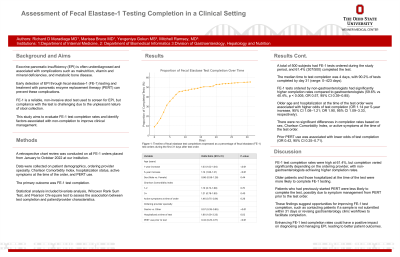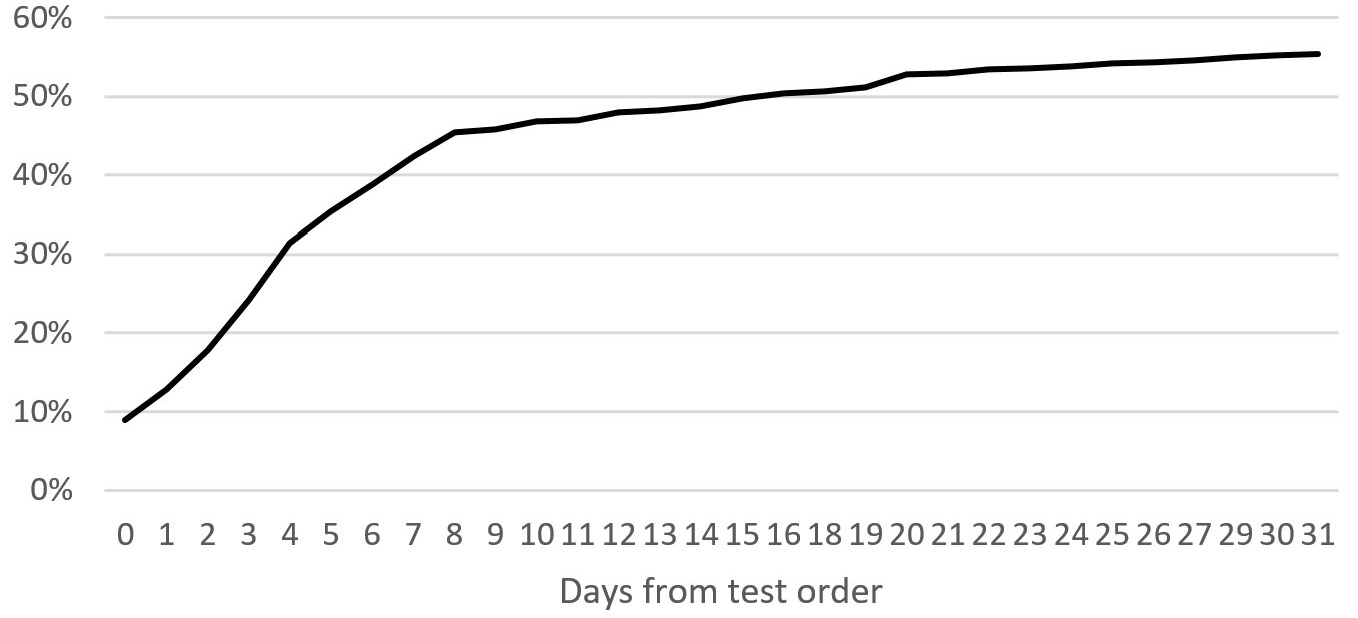Sunday Poster Session
Category: Biliary/Pancreas
P0030 - Assessment of Fecal Elastase-1 Test Completion Rates
Sunday, October 27, 2024
3:30 PM - 7:00 PM ET
Location: Exhibit Hall E

Has Audio
.jpg)
Richard Maradiaga, MD
The Ohio State University Wexner Medical Center
Columbus, OH
Presenting Author(s)
Richard Maradiaga, MD1, Marissa Bruce, MD1, Yevgeniya Gokun, MS2, Jordan Burlen, MD1, J Royce Groce, MD1, Sam Han, MD1, Phil Hart, MD1, Somashekar G Krishna, MD1, Peter J Lee, MD1, Georgios Papachristou, MD, PhD1, Da Yeon Ryoo, MD1, Hamza Shah, MD1, Raj Shah, MD1, Erica Park, MD1, Mitchell L. Ramsey, MD1
1The Ohio State University Wexner Medical Center, Columbus, OH; 2Center for Biostatistics, The Ohio State University Wexner Medical Center, Columbus, OH
Introduction: Fecal elastase (FE-1) is commonly recommended as the first test for suspected exocrine pancreatic insufficiency (EPI). An advantage to other testing strategies is the short duration of stool collection; however, FE-1 completion rates have not been assessed outside a research environment. Here, we report completion rates and features associated with completion vs non-completion.
Methods: A retrospective chart review was conducted on all FE-1 orders from January to October 2022 at our institution. Data included patient demographics, ordering provider specialty, Charlson Comorbidity Index, active symptoms at the time of order, hospitalization status, and PERT use. The primary outcome was the FE-1 test completion rate. Analysis was performed using bivariate analysis, Wilcoxon Rank Sum Test, and Pearson Chi-square test.
Results: Of the 500 subjects with a request during the study period, 307 (61.4%) completed the FE-1 test. The timeline of FE-1 completion is demonstrated in Figure 1. Of those who completed FE-1 testing, median time to completion was 4 days, and 90.2% were completed by day 31 (range 0-423 days). Tests ordered by gastroenterologists had lower odds of completion compared to non-gastroenterologists (40.4% vs 59.6%; P < 0.005; odds ratio (OR) 0.57; 95% confidence interval (CI) 0.39-0.85). Older age and hospitalization at the time of test order were associated with higher odds of completion (OR 1.14; 95% CI 1.08-1.21 per 5-year increase, and OR 1.90; 95% CI 1.09-3.33, respectively), but there was no difference in odds of completion based on sex, Charlson comorbidity index, or the presence of active symptoms at the time of order. Finally, use of pancreas enzyme replacement therapy prior to the test order was associated with lower odds of completion (OR, 0.42; 95% CI 0.25-0.71).
Discussion: Completion rates for FE-1 are generally high (nearly 2/3), and odds of completion differ based on patient and provider characteristics. Tests ordered by non-gastroenterologists had higher completion rates, which was an unexpected finding. These observations provide insights to enhance completion rates further, such as contacting patients if no sample is collected within 31 days or modifying gastroenterologists’ clinic processes to facilitate sample collection. This would be a valuable quality improvement project given the importance of FE-1 in the current diagnostic approach to EPI.

Disclosures:
Richard Maradiaga, MD1, Marissa Bruce, MD1, Yevgeniya Gokun, MS2, Jordan Burlen, MD1, J Royce Groce, MD1, Sam Han, MD1, Phil Hart, MD1, Somashekar G Krishna, MD1, Peter J Lee, MD1, Georgios Papachristou, MD, PhD1, Da Yeon Ryoo, MD1, Hamza Shah, MD1, Raj Shah, MD1, Erica Park, MD1, Mitchell L. Ramsey, MD1. P0030 - Assessment of Fecal Elastase-1 Test Completion Rates, ACG 2024 Annual Scientific Meeting Abstracts. Philadelphia, PA: American College of Gastroenterology.
1The Ohio State University Wexner Medical Center, Columbus, OH; 2Center for Biostatistics, The Ohio State University Wexner Medical Center, Columbus, OH
Introduction: Fecal elastase (FE-1) is commonly recommended as the first test for suspected exocrine pancreatic insufficiency (EPI). An advantage to other testing strategies is the short duration of stool collection; however, FE-1 completion rates have not been assessed outside a research environment. Here, we report completion rates and features associated with completion vs non-completion.
Methods: A retrospective chart review was conducted on all FE-1 orders from January to October 2022 at our institution. Data included patient demographics, ordering provider specialty, Charlson Comorbidity Index, active symptoms at the time of order, hospitalization status, and PERT use. The primary outcome was the FE-1 test completion rate. Analysis was performed using bivariate analysis, Wilcoxon Rank Sum Test, and Pearson Chi-square test.
Results: Of the 500 subjects with a request during the study period, 307 (61.4%) completed the FE-1 test. The timeline of FE-1 completion is demonstrated in Figure 1. Of those who completed FE-1 testing, median time to completion was 4 days, and 90.2% were completed by day 31 (range 0-423 days). Tests ordered by gastroenterologists had lower odds of completion compared to non-gastroenterologists (40.4% vs 59.6%; P < 0.005; odds ratio (OR) 0.57; 95% confidence interval (CI) 0.39-0.85). Older age and hospitalization at the time of test order were associated with higher odds of completion (OR 1.14; 95% CI 1.08-1.21 per 5-year increase, and OR 1.90; 95% CI 1.09-3.33, respectively), but there was no difference in odds of completion based on sex, Charlson comorbidity index, or the presence of active symptoms at the time of order. Finally, use of pancreas enzyme replacement therapy prior to the test order was associated with lower odds of completion (OR, 0.42; 95% CI 0.25-0.71).
Discussion: Completion rates for FE-1 are generally high (nearly 2/3), and odds of completion differ based on patient and provider characteristics. Tests ordered by non-gastroenterologists had higher completion rates, which was an unexpected finding. These observations provide insights to enhance completion rates further, such as contacting patients if no sample is collected within 31 days or modifying gastroenterologists’ clinic processes to facilitate sample collection. This would be a valuable quality improvement project given the importance of FE-1 in the current diagnostic approach to EPI.

Figure: Figure 1: Timeline of fecal elastase test completions expressed as a percentage of fecal elastase (FE-1) test orders during the first 31 days after test order.
Disclosures:
Richard Maradiaga indicated no relevant financial relationships.
Marissa Bruce indicated no relevant financial relationships.
Yevgeniya Gokun indicated no relevant financial relationships.
Jordan Burlen indicated no relevant financial relationships.
J Royce Groce indicated no relevant financial relationships.
Sam Han indicated no relevant financial relationships.
Phil Hart indicated no relevant financial relationships.
Somashekar G Krishna: Boston Scientific – Consultant. Mauna Kea Technologies, and TaeWoong Medical USA – Grant/Research Support. TaeWoong Medical USA – Grant/Research Support.
Peter J Lee indicated no relevant financial relationships.
Georgios Papachristou indicated no relevant financial relationships.
Da Yeon Ryoo indicated no relevant financial relationships.
Hamza Shah indicated no relevant financial relationships.
Raj Shah indicated no relevant financial relationships.
Erica Park indicated no relevant financial relationships.
Mitchell Ramsey indicated no relevant financial relationships.
Richard Maradiaga, MD1, Marissa Bruce, MD1, Yevgeniya Gokun, MS2, Jordan Burlen, MD1, J Royce Groce, MD1, Sam Han, MD1, Phil Hart, MD1, Somashekar G Krishna, MD1, Peter J Lee, MD1, Georgios Papachristou, MD, PhD1, Da Yeon Ryoo, MD1, Hamza Shah, MD1, Raj Shah, MD1, Erica Park, MD1, Mitchell L. Ramsey, MD1. P0030 - Assessment of Fecal Elastase-1 Test Completion Rates, ACG 2024 Annual Scientific Meeting Abstracts. Philadelphia, PA: American College of Gastroenterology.
